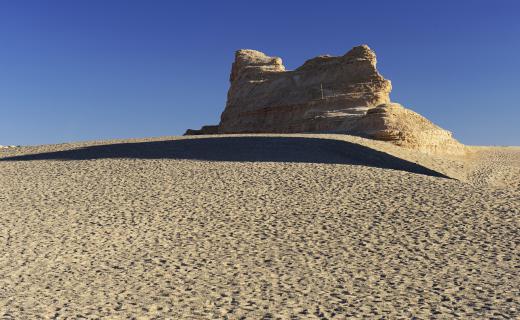What are the Different Types of Geology Tools?
A geologist is a scientist who studies the Earth and its formations. A geologist may be engaged in matters such as identifying minerals or assessing lava after a volcanic eruption. There are various industries which rely on the expertise of geologists, such as the mining industry. For geologists to perform their duties and provide valuable information they must use a variety of geology tools.
When geologists are concerned with identifying rock or minerals, they normally look at properties such as hardness, luster, and color. Geology tools used in this process include a streak plate, a hand lens, a dropper bottle, a penny, and a hardness scale. Although some of these items may seem very basic, they can tell a geologist a lot.

For example, pennies have little value in the monetary sense, but they are extremely valuable geology tools. A penny helps a geologist determine the hardness of his specimen. Since the hardness of a copper penny is known, it helps the geologist gauge whether his specimen is harder or softer.
Streak plates are also unsophisticated geology tools. A streak plate is generally a rectangular piece of unglazed ceramic. When a specimen, such as a mineral, is rubbed across, a streak of powder should be left behind. The color of the remaining powder is one thing the geologist examines. Although the specimen may be one color or range in colors, in some cases the streak will consistently be a different color.
The dropper bottle is important because one of the steps of identification is an acid test. Geologists often use hydrochloride. They squeeze a few drops onto their specimens to see how they react.

Striations on a rock or mineral are important to a geologist and can provide a lot of information, not only about the specimen but about the surrounding area. There are times when a geologist may be away from a lab where he has access to a powerful microscope. The hand lens is a tool that he will probably use so that he can take a closer look.
Since many geologists do work in the field a great deal, there are other geology tools that assist them in coping with their working environments. Pry bars, rock hammers, and chisels are often needed to break specimens or the material around them. Tracking devices such as compasses or an altimeter watch are also very important. Most geologists will not be happy if they leave a site and cannot find it again.

Which tools a geologist needs really depends on which questions he needs to answer. Many of the steps of rock and mineral identification can be skipped when once a geologist has enough experience. Also, in many instances, geologists are employed for tasks other than specimen identification. Then, a completely different range of geology tools is likely to be required.
AS FEATURED ON:
AS FEATURED ON:














Discussion Comments
@pastanaga - You do get to used rock hammers and other tools in geology courses though, particularly once you get past the first year.
I imagine most people working in geology commercially don't use geology hand tools all that often though. They probably have ways of creating computer simulations and drilling for samples that use a higher level of technology, since they are usually looking for oil or other underground resources.
@Iluviaporos - I can remember when I was at university how excited I was when I got to buy a lab coat and a dissection kit. It almost feels like you're stepping into the role of an actual scientist, so I'm not surprised your friend was excited.
I think a lot of basic geology relies on observation and simple analysis, rather than complex geologist tools. I took a class in geography that focused on a few geological principals as well and we did things like measuring distances between landmarks and the speed of water in streams, and compacting soil with our hands to determine if it was made more of clay or of sand. For the most part we weren't going anywhere that wasn't already completely surveyed and known so we weren't really contributing anything new and I don't think it would have been a particularly good idea for us to start chewing up the earth with rock hammers just to figure out things that didn't need to be figured out.
When I was at university, one of the guys in my dorm was very much into being a geologist and he was so proud of his rock hammer. He named it and everything.
I don't know how much he ever actually used it, because he only went on the occasional field trip and never seemed to bring many rocks back with him.
Post your comments